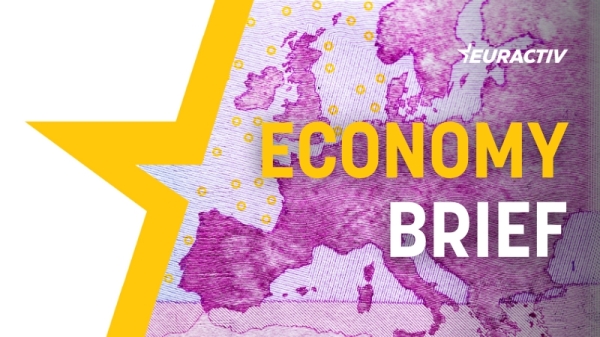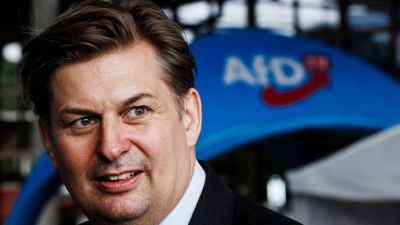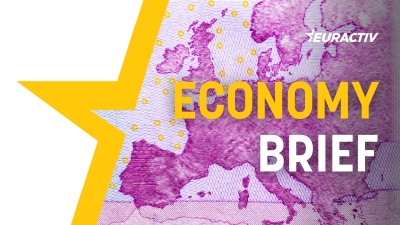Have low wages permanently ‘scarred’ Europe’s economy?

“Happiness is bought with suffering,” Fyodor Dostoevsky once wrote.
European workers may argue that they’ve already endured their fair share of economic pain over the past few years, as they saw their real wages shrink despite a surge in nominal values. Economists now hope they will turn to a more literal kind of buying, fearing the consequences of what might happen if they don’t.
In a speech delivered in Brussels on Wednesday (27 March), European Central Bank (ECB) executive board member Piero Cipollone said that real wages, which fell across the EU by 4.3% in 2022 and 0.7% in 2023, must “recover” to a level such that the eurozone’s weak growth rate does not become permanently entrenched.
“If real wages do not recover, this could increase the risk of protracted economic weakness, which could cause scarring effects, as investment and supply capacity adjusted to persistently low demand,” Cipollone said.
In other words, if real wages remain low, workers will continue to make fewer purchases. This, in turn, will cause companies to expect fewer purchases and, ultimately, produce fewer things.
Cipollone also noted that the drop in real wages over the past two years has had another, more unexpected consequence: it has accelerated Europe’s deindustrialisation.
“The decline in real wages in the last two years, combined with higher financing costs, has reduced the price of labour relative to capital and other inputs such as energy,” he said.
“This disincentivises investment in capital-intensive sectors, such as industry, which tend to have a higher level of productivity. Incentivising the continued hoarding of labour, further weighing on labour productivity.”
Cipollone argues that because labour is so cheap, companies would be less motivated to invest in machinery and other capital goods that allow the average worker to produce more things. Instead, firms are incentivised to hire more workers — or “hoard” the ones they currently employ.
Arguably, his fears seem corroborated by data.
Eurostat, the EU’s official statistics office, reports that year-on-year industrial production in the eurozone fell by 6.7% in January. Industrial production of so-called capital goods, such as machinery and equipment, fell by almost twice as much (12.1%).
Ludovic Voet, Confederal Secretary of the European Trade Union Confederation, representing 45 million European workers, has previously noted that the steep drop in capital goods output represents a “canary in a coal mine”.
“The biggest hit is the long-term investments in buildings and equipment,” Voet told Euractiv earlier this year. “Yet investment in the future is exactly what we need.”
Sander Tordoir, a senior economist at the Centre for European Reform (CER), which hosted Wednesday’s event, told Euractiv that the ECB official’s concerns about the negative repercussions of persistently low wages are “exactly right”.
“Overly-long depressed demand and distortions between labour and capital may undermine capital investment and labour productivity, eroding European industry and growth,” he said.
“A pickup in wages to restore the labour share in the economy is key to avoid such a fate,” he added.
Patricia Velicu, a senior policy adviser at Industrial Europe, representing seven million employees in Europe’s manufacturing, energy, and mining sectors, noted that sustained real wage growth will generate higher consumption and, ultimately, greater production.
“You want to keep the purchasing power [of workers] relatively high because you want to maintain consumption [and] motivate workers to buy cars and other products that industry produces,” she said.
“[This is] one of the arguments why high wages are also good for the European economy… because the order books are going to be full and you have to produce.”
The ECB’s response to such arguments, of course, would be to emphasise that real wage growth, while in some respects desirable, could cause an unwanted resurgence in inflation.
Indeed, in his speech, Cipollone noted that the eurozone’s current annual wage growth of 4.6% “needs to moderate” if inflation — now at 2.6% — is to drop to the bank’s 2% target.
ECB president Christine Lagarde has also repeatedly stressed that the ECB “will never compromise on [its] mandate” of ensuring that inflation returns to 2% “over the medium-term”.
Tordoir, however, warned that the ECB’s failure to boost the eurozone economy by cutting interest rates from their current record-high levels in a timely manner could lead Europe to suffer “secular stagnation”, whereby chronically low growth is coupled with persistently below-target inflation.
“The ECB has a monetary policy interest in avoiding a return of a secular stagnation scenario in which inflation undershoots the [2%] target,” he said. “Avoiding scarring [the EU’s economy] is essential for that.”
Chart of the Week
Real wages have risen modestly across the eurozone over most of the past decade, as our Chart of the Week shows, but have fallen sharply in the past couple of years, as rapid price rises outstripped nominal wage growth in the aftermath of Russia’s full-scale invasion of Ukraine in February 2022.
Fortunately, analysts now expect real wages to begin to rise again this year. Unfortunately — and as noted in a previous Brief — economists’ projections often undergo meaningful revisions.
Economic Policy Roundup
The European Commission will sign a strategic partnership with Australia on critical raw materials, a source familiar with the issue told Euractiv. Separately, the Commission’s Director-General for Internal Market, Industry, Entrepreneurship and SMEs, Kerstin Jorna, told Euractiv that four partnerships are “in the negotiation [stage] or ready for signature”. The deal comes as the EU tries to reduce its dependency on China for critical raw materials that are key to the bloc’s green and digital goals. Australia is especially rich in lithium, an element used in the production of mobile phones and electric vehicle batteries. Read more.
China’s efforts to “de-risk” its economy from the West through massive investments in manufacturing and strategic technologies are exacerbating Europe’s industrial decline, warn experts and business leaders. Beijing’s push to achieve greater strategic independence from the West — which long predates the EU’s plan to “de-risk” from China — comes amid weak Chinese demand for manufactured goods such as solar panels and electric vehicles. This, in turn, has pushed down global prices and led to accusations of “dumping” by European officials and business leaders. “It’s a double whammy: China’s de-risking plus its lack of consumption are contributing to our deindustrialisation,” Alicia García-Herrero, a senior fellow at Brussels-based think tank Bruegel, told Euractiv. Read more.
The European Central Bank’s hesitation to cut rates before further signs of slowing wage growth reflects a ‘hawkish bias’, leading to weak growth becoming entrenched across the eurozone economy, warns the head of a leading European think tank. Jeromin Zettelmeyer, director at influential EU policy think tank Bruegel, said on Wednesday (27 March) that the ECB is facing a “delicate balancing act” between ensuring that wage increases do not trigger an inflationary resurgence and averting the risk that its restrictive policy unduly damages Europe’s “very weak economy”. However, he noted that the ECB’s decision to wait for further wage data — even though the bloc’s annual wage growth slid from 5.1% to 4.6% in the final quarter last year — puts excessive emphasis on inflationary headwinds and by doing so threatens to trap the eurozone economy in a scenario of “secular stagnation”, or long-term low growth. “I would interpret this as reflecting quite a conservative bias, quite a hawkish bias,” he said. Read more.
Literature corner
Vested interests must not block capital markets union
Emerging countries have replaced most of Russia’s lost trade with advanced economies
[Edited by Rajnish Singh]
Read more with Euractiv




